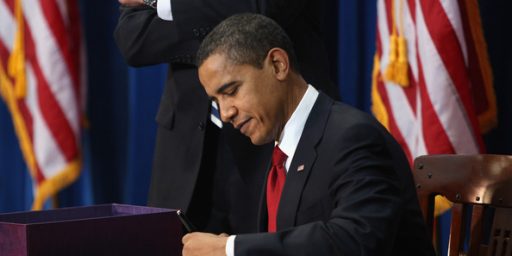Intellectually Honest Conservatives
Andrew Sullivan continues to provide ammunition to those who argue that he isn’t, despite his claims to the contrary, a conservative with his post “If The Right Were Intellectually Honest …” It’s one thing to argue that the Bush administration or the dominant faction of the Republican Party is wrong or dishonest or whathaveyou. But it’s hard to constantly criticize the legitimacy of one’s side and continue to plausibly claim to be on that side. The point of the Yglesias Award is to recognize those who occasionally cede a point to the other side; if one does it all the time, one has switched sides.
Beyond that, the argument itself strikes me as bizarre:
The GOP has passed what amounts to a spending and tax-cutting and borrowing stimulus package every year since George W. Bush came to office. They have added tens of trillions to future liabilities and they turned a surplus into a trillion dollar deficit – all in a time of growth. They then pick the one moment when demand is collapsing in an alarming spiral to argue that fiscal conservatism is non-negotiable. I mean: seriously.
If I understand correctly, the logic is that:
1. Bush and the Stupid, Dishonest Right screwed up our economy by spending too much money stimulating it.
2. To fix it and remain (er, become?) honest, they must therefore agree to spend too much money now (and, presumably, evermore?) stimulating it.
And what of those of us on the Right who opposed excess spending during the Bush years? Wouldn’t it be intellectually dishonest to be in favor of it now? Or must we agree simply because it’s now called “stimulus” rather than “wasteful spending”?
For that matter, what of those of us who dislike the idea of massive spending but are halfheartedly persuaded that it’s nonetheless necessary in the present case and simply want to direct it appropriately? Can we at least argue for spending no more than necessary and targetting it in ways we’d prefer?
For that matter, even if we’re speaking only of elected Republicans, it should be noted that there are now decidedly fewer of them in Washington. What if they’ve honestly been chastened by their electoral failures and have decided to get back to basics? Is that dishonest?






Intellectually Honest Conservatives http://bit.ly/2Xt5H A MUST read! #tcot #stimulus
I think it was you who argued earlier today that we elect our representatives to make their best judgment, not to follow the whims of the electorate. (Please excuse me if that wasn’t you.)
Whether any particular representative is dishonest would depend on if they followed that policy and are now flopping because they feel their power is threatened.
Anyway, those of you who were fiscally conservative all along are in a tough spot. When the Repubs are in power, they apparently don’t listen to you. But on the other hand, enough Dem spending will cause the pendulum to swing back sooner or later, largely depending of course on what effect if any their policies have.
Sullivan’s logic is even simpler and more ironclad that that:
The Bush spend like a drunken sailor and cut taxes policy was not stimulus, it was highly inflationary. Through clever actions that may have even been intentional, that inflation was expressed as the housing and derivative bubbles instead of CPI inflation. That bubble has collapsed, and a great deal of wealth has been, and will be destroyed in the process. The question is, do we continue to destroy that wealth through deflation or through inflation? Deflation is the more dangerous. Government spending during the collapse will be economic stimulus and, more importantly will, be inflationary in a traditional sense, at least we better hope it will be. For real fiscal conservatives, Bush’s spending was an abomination that led to the current situation. Where were the rainy day fiscal conservatives when it mattered?
I doubt that Goldwater would be considered a conservative by today’s nouveau and neo conservatives.
James, it is a bit of a strain for me to get a reading out of Andrews post that he is criticizing these people.
Again I don’t think Andrew has a problem with this…
Well, let us consider this group: Aren’t these the same Republicans who largely rolled over for every spending program Bush dreamed up and tax-cut he couldn’t dare to live without even if they caused, as Andrew said, “tens of trillions (of) future liabilities and they turned a surplus into a trillion dollar deficit – all in a time of growth”?
Even if you give them the benefit of a doubt(at one time or another, each of them may have voted against some one thing at one time or another), look at how long it took for Bush to use his veto pen. All of a sudden there is a Dem in the White House, the Dems control the House and the Senate, and suddenly, miraculously, they all become fiscal conservatives again? Especially when one of their best arguments against the Stimulus bill is a total fraud? Now, there’s some intellectual honesty for you.
I suspect even Steve Verdon would think that maybe you have been hanging around the punch bowl a little too much.
Yet, when the Republicans nominate a Presidential candidate obsessed with earmarks and budgetary issues and a Vice-Presidential candidate that had a record of balancing the budget, the guy claiming to be the true conservative was crazed in his hostility to them.
He uses the subjunctive mood about “the Right,” which most certainly encompasses those people. The man’s classically educated in the OxBridge style, a Harvard PhD, and was editor of one of the most prestigious political journals at a young age. It strains credulity that he’d be so careless with his language unintentionally – let alone repeatedly.
And what of those of us on the Right who opposed excess spending during the Bush years? Wouldn’t it be intellectually dishonest to be in favor of it now? Or must we agree simply because it’s now called “stimulus†rather than “wasteful spendingâ€?
Good questions and this is where I sit.
I am not a fan of spending for the sake of spending-especially when the price tag is almost a trillion dollars and more than that if some of the funds remain as budget items in future budgets.
Personally I would rather the GOP be fiscally conservative now then not at all. I am already tired of the “but the republicans did it too” mantra that comes with any criticism of spending by the democrats.
At some point that mantra won’t work anymore.
Only if whats in there is good, and James is going to drink it all without sharing!
I would like to think this is true, that Republicans are going back to the view that government isn’t the answer and that we need less of it, thus allowing for lower taxes. While I think there are conservatives like this, and some may have always thought this way, I don’t think it is a large enough contingent to say this is true in general.
You’ve got to be the last person in the world who takes Sullivan seriously.
Stupid and dishonest and unselfaware are not good characteristics. It’s quite a hat trick when you put them all together.
“Yet, when the Republicans nominate a Presidential candidate obsessed with earmarks and budgetary issues and a Vice-Presidential candidate that had a record of balancing the budget, the guy claiming to be the true conservative was crazed in his hostility to them.”
That made me laugh for a really long time. Earmarks, LOL. Alaska, LOL.
Anyway, it is nice to see Republicans again talking about the debt. Where have you been for the last 28 years? BTW, in case you forgot, remember to put in the b, it is silent, just like most Republicans have been on the issue of our debt.
Steve
FWIW, I was very much down on wasteful spending, and deficit, and debt (and tax cuts during the same), but have been convinced that “stimulus” is at least arguable.
Well, I didn’t have to be convinced, it’s been in the textbooks, right? The argument isn’t that there is really such thing as stimulus, but rather if this is really the time for it.
(My mood today is cynical, that the stimulus bill we got is not terribly good, but I’m not sure Congress could identify or implement a better course. “Do nothing” still strikes as an easy out, especially when it’s done from the wings with confidence that the advice will never be followed.)
There probably are under one thousand real conservatives and real liberals in the United States. Almost everyone else holds some mixture of conservative and liberal positions.
Curiously enough, both true conservatives and true liberals hold to the “if you’re not with me you’re against me” division both think non-purists are actually purists of the other groups. You especially see this with discussions about the media, where true conservatives think the media is hopelessly liberal, and true liberals think its completely conservative. And by both groups are probably correct within their criteria – the media tends to be anything but pure in any way at all.
What Sullivan misses it that the President he endorsed in 2000, campaigned on a heterodox version of conservatism that included expansion of health care entitlements, federal involvement in education, and entitlement reform. And of course, some rather conservative things that Sullivan opposes: tax cuts, opposition to gun control and expanding Clinton’s faith-based initiatives. It’s hard for me to see that Bush wasn’t as promised, except for one issue: two wars that at one time Sullivan supported.
Environmental moderates got a raw deal, PD.
Environmental moderates? First of all, what were the campaign expectations for Bush on environmentalism? And how weren’t they met? Frankly I can think of no expectations and therefore no disappointments.
James, with all due respect, you need to go back and read Andrews post again (just went there and re-read it myself). He only refers to “the Right” in the title to the post, after that, in the body of the post, he always refers to the “GOP”.
As of right now, (and Andrew has touched on this before) the GOP is the “de-facto representative” of the right, and he is not happy about it. (yeah, I know, there are the Libertarians, but how many of them are in Congress?) And why is he upset about it? Because the GOP has abandoned so many on “the Right”…. but now all of a sudden they are once again, the friend of “the Right”?
James, I know that you are a conservative, but really, is the GOP your party? As it is was then? As it is now?
I gave up on the Dems in Nov of ’02, how about you?
Steve, I knew you would appreciate that.
Which is my point entirely. I too would like to believe this is true, but I have been too long an observer of politics to ever go that far. Mind you, unlike you, Steve, I do believe there is such a thing as an “honorable” compromise… You know, that sometimes one has to give a little to get a lot (or vice versa).
I just don’t see that here, where %100 of the house GOP votes against what they have not had a problem with in 8 years.
I meant to say Oct of ’02, not Nov….
Funding a war or emergency spending should get special consideration. However loading them with pork and other non war\emergency spending is awful. The indirect third cousin impact doesn’t cut it as an excuse either. For example tagging on educational spending saying “it related to the war because we want smart soldiers†B.S. argument.
Any war\emergency funding should be counter with cuts in other programs the following years. Many of us conservative have had problem with the GOP caving in to DNC to increase spending because that was the only way the Dems would let them pass anything. The GOP should have stuck to the guns even it label them as a do nothing Congress. There was too much of the GOP getting in their own pork projects as well.
The Dems excuse of it O.K. to spend a great deal more than the GOP because the GOP spend more than they should have is pretty lame.
The reason the GOP fell from power is they didn’t uphold their principles. Hopefully they have rediscovered them. It is hard to trust them because most people true principles don’t show until they have the power not to follow them.
Does either party ever follow its principles? If you look at actual spending over the last five decades, there doesn’t seem to be a whole lot of difference between parties. The rhetoric changes, but the spending more or less stays the same. They just find different excuses for it.
Wayne –
The problem with bush’s emergency spending is that he cut taxes. A fiscal conservative would have called for tax increases to cover the cost if program cuts could not be pushed through. If the war is not worth the cost of funding, it is not worth the cost of fighting. No rational individual cuts taxes when you have to fund a war.
Are you kidding? Andrew Sullivan is one of the most conservative people around. The nimrods at NRO, Worldnutdaily, FoxNoise etc aren’t conservatives. They’re christianist lunatics.
Said it before, but I will say it again: There is a difference between conservative philosophy and conservatory ideology. One engages the mind, and examines criticism. The other is rigid, and rejects criticism. One is willing to examine science and the increasing complexity of our society when problems arise. The other holds fast, advancing “principles†as solutions to our problems.
Modest reflection will point out what I have said before; conservative philosophy, conservative ideology, and the GOP are not the same entity. These distinctions are relatively clear in this post, and the ferment it has engender among James correspondents.
Andrew Sullivan falls more into the conservative philosophy camp, he is willing to examine issues, take a stand, and if time and events prove him wrong, say why, and change course. I kind of enjoy Sully, he at times forces one to examine the other side of the coin. Gasp, said the conservative ideologue, a coin with two sides?
The question is what caused this barring of the ideological chest by Dr. Joiner, this cry of why should we, bearer of “principles†be tarred by the ghost of Bush? Some have advanced the punch bowl, when we have already established that James preferred libations are beer and wine.
My own view, Sully’s post expands on the link he presented by Jim Manzi, which deserves a careful read. There in, Manzi advances five things that aught to be done. Four are straight out of the conservative ideological play book. One which is not stands out. To wit:
Gasp, scale back the Defense Department? The data cannot be argued, since President Reagan, in good times and bad, the National Debt increased, Defense spending increased, and taxes decreased. The amount of money in, did not pay for the money going out. The single exception was during the Clinton years when DOD spending decreased, and partially held in check.
Said it before, but I will say it again: Complex problems deserve some degree of simplification. Sister Ann Telnaes says it all in less than 10 seconds. Until the GOP, and its conservative enablers, recognize the silliness of their arguments, the Grand Old Party will continue its death spiral, dragging conservative philosophers with it…
By the way, the man standing behind McCain in Ann’s political cartoon is clearly John Boehner of the House of Representatives. He was inordinately proud that not one Republican crossed the line and voted for the stimulus bill.
Ah, John, some of us remember your great defense when you distributed checks from the tobacco lobby on the House floor. It was not illegal, so it was permissible. So how many checks did you distribute this time, behind closed door?
I still prefer the GOP to the only electoral alternative but am less enamored of them than I was, say, six years ago. Sullivan and John Cole have left the reservation while several of us (Steven Taylor, Steve Bainbridge, for example) are grumbling from (barely) inside its borders.
For PD:
George W. Bush 2000 On The Issues – Environment and Natural Resources
Maybe the typical election BS (HS?), but it reinforces what I remember in Q&A etc.
I think Excitable Andy has forgotten, through his BDS, that it was primarily elected Republicans, not the conservative base, that supported those big spending plans, and that we were right PO’d about the spending.
He really should just stick with his Trig Palin conspiracy theories. At this point, he is a joke.
To my mind, intellectual honesty would require that the GOP at least attempt to explain why spending by the GOP was good but spending by the Dems is bad. Why is that too much to ask?
Political parties change Franklin, and further you do not have to pursue a policy of wasteful spending to wastefully spend. You merely have to say “oh that’s a good idea” a few too many times. So, indeed, they are not necessarily being so much intellectually dishonest as learning discipline and finding that under these situations it is possible to be fiscally conservative and still keep their committee posts. It could be that they always held this viewpoint, but Trent Lott was going to send them to political Siberia if they actually worked it in to their governing.
And anyways, there is an upswing to every recession so your “pendulum” may not work too well if the economy comes back simply because of declining production costs (an effect of deflation, the cause of this recession), Obama’s still in office, and people accredit this to him even though the economy recovered by natural causes and he actually prevented it from fulfilling its full potential.
Your party could have been a lot more loudly conservative when you had an allegedly conservative president, now your party has lost its majority its definitely sour grapes to claim a moral high ground.
As each dollar is spent in stimulus I hope the right learns its lessons.
Timing in politics, as Disraeli observed, is all. While it may not have made sense to permit deficit spending in the growth conditions of 2003 to early 2008 (even if the growth was based on a bubble in real estate) there’s a good economic argument to be made for supplementing aggregate demand in a recession, particularly a recession as severe as the current one. Even the two thirds of the GOP who want a wholly tax cut based stimulus recognize that. The other third prefer Hooverian inaction which politically is suicide.
This is a huge amount of money, it’s as much as we’ve spent in Iraq so far, so the notion that it’s going to have either no stimulative effect on the economy or even as some conservatives claim, make matters worse, is totally wrongheaded; more the product of partisan prejudice than any knowledge of basic economics. It’s going to have an effect alright and the GOP knows it, hence the effort to impede it’s progress. Combine it with the natural resilience of the US economy and its very, very likely that by next Spring that a recovery will be underway. And Obama and the Democrats, as The Economist points out, are going to get the credit for it regardless of how much they had to do with it.
Taking the wider issue, Republicans have done themselves a deal of harm over this outside their own narrow base. Basically the country sees that it’s own interests are tied to a recovery and this combined with liking and respect for the new president makes them anxious for it to succeed. Against this background to gallop into a canyon with OBSTRUCTION and WE WANT FAILURE written over the gate seems a very risky proposition. Obama let this notion get firmly imprinted on the national consciousness and then he slammed the gate behind them with a couple of highly emotive townhalls including some with esteemed Republicans, and a superb press conference where he once again came off as serious, articulate, knowledgeable, conciliatory, and likeable. Republicans forget this guy has complete access to the bully pulpit and few know how to use it better. Even events like the Gregg withdrawal (which btw was massively overblown, this is a second tier cabinet position that has very little public resonance) reinforced the notion that Obama was TRYING TO PUT A REPUBLICAN IN HIS CABINET and got a rejection.
The polls tell the story. Obama has appros for handlng this from the mid sixties to the mid seventies and the Republicans are in the low thirties.
Sullivan apart from a couple of hobby horses, homosexuality and catholicism, is a thoughful conservative and a very good writer-there’s nothing like an Oxford/Cambridge education for teaching you how think clearly and polish phrases (I went to Cambridge so I may be biassed). He could be overplaying the conservative jihad against Obama a little but there’s no doubt this early effort was an attempt to embarrass the president and hence slow his momentum. It’s failed dismally imho and the polls confirm it, but it probably has a more serious longer term implication for Republicans which most bloggers who have little knowledge of how govt really works are missing. They are effectively deciding to exclude themselves from participation in writing a mass of society changing bills that are going to roar through congress in the next 18 months and get firmly embedded in the national woodwork. In the house the Democrats are going to be in no mood to let them in either because of the events of the last few weeks. Many of the bills are going to get written in conference which requires only an up or down vote in the senate and for those bills where some measure of bipartisanship is needed the Senate Democrats can make bilateral deals with interest groups. Whatever the irredentists may believe this is not a good idea for the Republicans. In fact as many commentators are pointing out they are in some difficulty but don’t seem to realize it. Perhaps because the repeated messages from largely discredited pundits like Limbaugh, Kristol, Hannity et al that all is well and all that is needed is more of the same and a return to power is inevitable. Count me among the unconvinced.